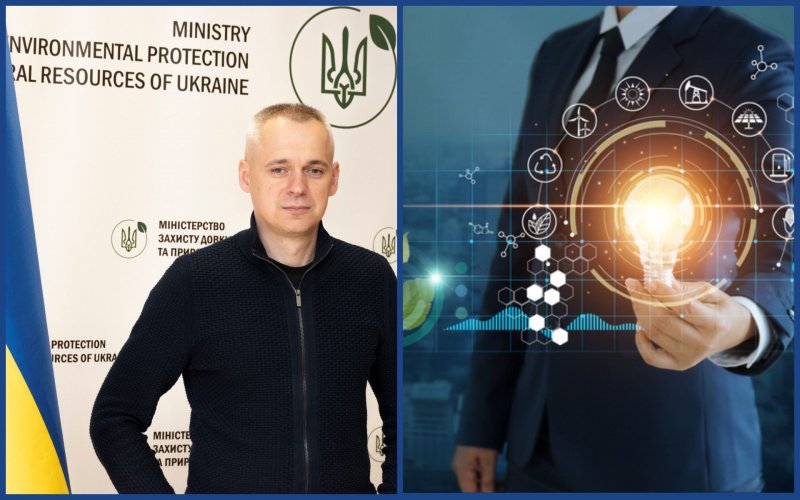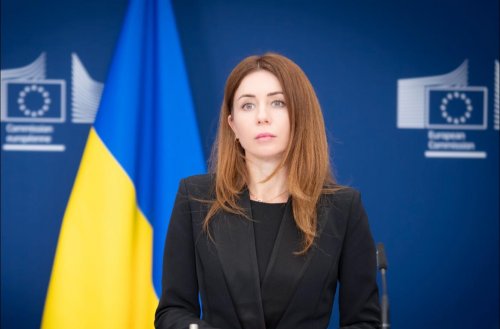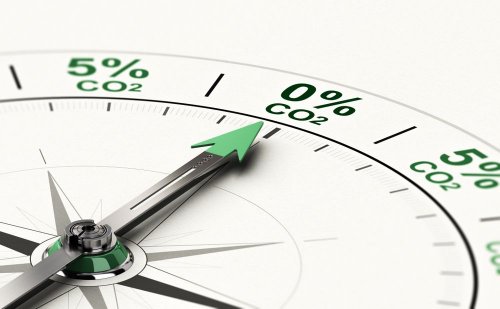EcoPolitic continues to introduce its readers to the new team of the Ministry of Environmental Protection. In May 2022, the newly appointed minister Ruslan Strilets brought a new team to the department. Yevhenii Fedorenko became one of his deputies. He coordinates work on the formation of state policy in the field of waste management, sustainable subsoil use, environmental and chemical safety. His responsibilities also include European integration and the fulfillment of the "environmental protection part" of the obligations under the Association Agreement with the EU. Similarly, as well as coordination of work with international technical assistance projects, international cooperation with partner countries and organizations in matters of environmental protection.
We spoke with Mr. Fedorenko about his success in office, the current state of harmonization of Ukrainian legislation with European legislation, and the work of the Ministry of the Environment during the war. More details — in the material.
- What has already been implemented during your tenure?
In the conditions in which our team had to work (I mean the state of war and all the challenges the country is facing), I believe that we have good results.
We succeeded in launching the reform of the chemical safety system in the country. Last year, the Law "On ensuring chemical safety and management of chemical products" was adopted, on which our team worked with OSCE experts. In fact, this is the foundation on which Ukraine will build its chemical safety today in order to take maximum care of protecting people and the environment.
Before that, we had an outdated Soviet system. As a result, we had a situation where particularly dangerous substances, which were removed from the markets of other countries, were freely exported to Ukraine, no one assessed the risks, and no one took responsibility.
We are now implementing new European approaches. And as a result, we will have the tools to prevent products with carcinogens, mutagens, bioaccumulative, toxic substances, etc. from entering the Ukrainian market.
In addition, for the period of martial law, we defined a list of chemicals whose trade may be prohibited in Ukraine and which may be seized from enterprises, institutions and organizations for security reasons. It was approved by the Government last summer.
We have changed the rules of operation for underground users. Therefore, in December, due to the advocacy of our team, Law №2805-IX was adopted, which improved the legislation in this area. And in fact, we started on the path of deregulation.
What does it give the country? We understand that the country's economy depends on how efficiently this industry will work. Energy security depends on this. And this will affect whether Ukraine will have enough raw materials for the reconstruction of cities and settlements. (By the way, we have already developed a map of construction minerals together with the State Geological Survey. Currently, access to it is closed, but we are ready to provide subsoil users with the necessary information after the victory).
A Memorandum on technical assistance with the EBRD regarding the allocation of 2.4 million euros for the digitization of geological information was also signed.
In addition, finally, after so many years of discussions, efforts, and failures, we managed to launch the reform of the waste management system. Last June, the Verkhovna Rada approved the framework European integration law "On waste management". The law is a parliamentary one, but the Ministry took an active part in its finalization and took a clear position — the document must be adopted if we want to continue moving towards the EU and solve our waste problems. That is why we advocated this bill.
- In the past, you dealt with the topic of waste management in the ministry for more than a year. Now your activity is related to this topic as well. What is the ministry doing to combat illegal landfills and landfills?
In fact, illegal landfills and landfills are what we all see on the surface, ultimately. But the problem is much deeper. Because let's be honest, what leads to the formation of such landfills?
This is also the absence of a separate waste collection system, when people would know that they are sorting garbage for a reason and that as a result it will go to processing. This is also the lack of necessary capacities for such processing. This is also the absence of well-functioning sanitary cleaning schemes in populated areas. This is also the absence of an information system for waste management, as a result of which the state cannot control how much waste is generated and where it goes. This is also a low level of responsibility for violating the requirements of the law, which leads to new offenses. This is also the absence of extended responsibility of the manufacturer, under which the manufacturer should collect and dispose of the packaging that he released to the market. And this list can be continued.
At the same time, what is the situation with waste in the country? Every year, we generate about half a billion tons of waste (and this is only according to official statistics). In terms of one person, there is up to 12 tons of waste per year, and 828 tons per square kilometer of territory. In the EU, these figures are 5 tons/year and 567 tons/km2, respectively. This is about education. Accumulation volumes are even more impressive – 15 billion tons per year. Such data are provided by official statistics. Experts increase this indicator to 36 billion tons.
Therefore, it is necessary to solve the problem comprehensively. How? There is no need to invent anything special here. It is enough to refer to the experience of international colleagues who have gone through this path quite successfully. We are currently 20-30 years behind our European neighbors in terms of waste management. Today, Ukraine is the only country in Europe where the state does not have control over waste, and more than 90% of it is buried in the ground.
To change this, the framework European integration law "On waste management" was adopted. That is why the Ministry of Environment insisted on the need for its approval. The document implements the provisions of Directive 2008/98/EC on waste. And in fact, it provides an opportunity to initiate the necessary changes to qualitatively change the situation in our country: to implement the European hierarchy of waste management; organize waste management planning at the national, regional and local levels; close the old landfills, and bring those that remain to European standards; to create conditions for the construction of modern waste processing infrastructure according to European rules; establish the "polluter pays" principle; implement extended producer responsibility, etc.
According to our forecasts, the implementation of all planned measures within the framework of the reform will allow:
- cover 100% of the country's population with a separate waste collection system;
- create conditions where more than 50% of household waste will be recycled and recovered, and no more than 30% will be landfilled;
- close and rehabilitate landfills that currently do not meet the requirements of the law;
- to build modern factories for the treatment of household waste according to the cluster approach. For this, we definitely need to create favorable conditions for attracting investments in the field.
In addition, the Ministry is currently working on the development of regulatory documents to strengthen criminal and administrative liability for offenses in the field of waste management. And also on the creation of economic tools, so that it became economically more profitable to recover waste in our country than to bury it.
All these measures should contribute to the fact that in a few years from the moment of implementation of the reform, unauthorized landfills and landfills should disappear in the country.
- As an expert in the field of household waste management, how do you assess the strengths and weaknesses of draft law 2207-1d? In your opinion, what problems may arise with its implementation?
As an expert, I can only say one thing: the adoption of the Framework Law is a significant step forward for Ukraine. Because before that, we had a law in force back in 1998. Of course, a quarter of a century ago, it was a rather progressive document, which was based on the provisions of the European Directive 75/442/EEC on waste (1975).
However, in 2008, the Europeans changed their legislation by adopting the Waste Directive 2008/98/EC. Unfortunately, during this time, Ukraine was only able to introduce two dozen changes to the current legislation on a case-by-case basis. Even the morphology of garbage has fundamentally changed since 1998, and we continued to be guided by outdated legislation.
During the last cadences of the parliament, there were enough legislative initiatives aimed at regulating this area. But due to various reasons, they did not find support. The most successful, in our opinion, was draft law №2207-1, which as a result was approved by the Parliament.
But one must understand that the adoption of the framework law is only the first step. By itself, the document will not work until the necessary legal basis is developed.
In general, on the way to the practical implementation of the reform, we must first develop 12 draft laws, 11 draft Government resolutions, and 7 Ministry orders. And this is without taking into account the regulatory framework that is needed to implement sectoral legislation in this area.
And if this regulatory framework is not prepared — this will be the main risk of failure of the reform . We understand this, so we are actively working on the necessary documents.
In December, we presented the Roadmap of the reform — what we will do to ensure that all the mechanisms prescribed in the Law work in practice. And the Ministry is purposefully and consistently moving step by step according to the planned plan.
- In particular, you have five years of experience in implementing international projects. How can you assess the integration of Ukrainian environmental legislation with European legislation? To what extent do we fulfill the Association Agreement in terms of environmental legislation?
The Ministry is actively involved in the implementation of European legislation in the environmental sphere and is in the top ten among other ministries in terms of the level of implementation of the Ukraine-EU Association Agreement. Thus, for 2022, the state of implementation of the Association agreement in the area of the environment increased from 61% to 70%.
Last year, 9 European integration laws were approved. In particular, these are the already mentioned Laws "On waste management", "On chemical safety and management of chemical products", "On amendments to some legislative acts of Ukraine on improving legislation in the field of subsoil use", as well as on Forest Conservation, on the National Register emissions and transfer of pollutants, etc. Another 3 draft laws were passed in the first reading last year. Currently, 9 European integration bills are in the parliament.
The Ministry plans to develop 27 more draft laws and more than 170 regulatory acts in the next two years for further approximation of our legislation to EU law.
- In addition to calculating the damage to Ukraine's environment from the war, what are the priority tasks facing the ministry?
In fact, there are many tasks — this includes work on the post-war reconstruction plan. The National Plan, which is being developed by the Government, contains the section "Environmental Safety". In it, we have already identified 9 key reforms that should be carried out in Ukraine; about 200 normative legal acts that must be adopted; 90 specific tasks by years and stages of their implementation, as well as 53 projects with a total cost of 25.5 billion euros. This section is a work in progress.
Among the tasks of the Ministry are the further movement along the European integration course, and strengthening of cooperation with international partners, and the continuation of the implementation of already started environmental reforms and the launch of new ones.
For example, this is the reform of the nature reserve fund, forestry, reduction and control of industrial pollution, and in fact, the creation of conditions for the "green" recovery of enterprises. This is the development of the reform of the waste management system...
It is important for us to launch a state environmental monitoring system to collect, process and publish data on the state of the environment and predict changes. The Ministry will continue to work on the deregulation of environmental services and digitalization of the entire sphere. In fact, there are a lot of tasks and plans.
- How is the interaction of the Ministry with experts and public organizations structured?
We actively work with experts of international technical assistance projects, the Reform Support Team under the Ministry of Environment. In particular, such experts help us in developing and implementing reforms — public administration; environmental control and assessment; reduction of industrial pollution and air quality monitoring; subsoil use, implementation of climate policy, further implementation of CEO and EIA, etc.
Also, the Ministry of Environment, like all other state authorities, conducts public consultations on roadmaps of reforms and projects of developed normative legal acts.
Scientists, experts and representatives of public organizations are part of the working groups and advisory bodies of the Ministry. A public council works under the Ministry. We are always open to dialogue, constructive suggestions and joint work for results.
- What is the Ministry doing to develop the circular economy in Ukraine? Please tell us about specific cases.
The Law "On waste management" provides for the implementation of circular economy principles in Ukraine. For example, through the introduction of extended producer responsibility. And we are currently finalizing the draft laws "On packaging and packaging waste", "On batteries and accumulators", "On waste electrical and electronic equipment", which will allow the launch of waste disposal systems in these areas.
Work continues on the project of the Law "On limiting the production and circulation of single-use plastic products in the territory of Ukraine", "On waste management of the extractive industry".
The Ministry of Environment is also currently working on updating the National Waste Management Plan and bringing it into line with the new Framework Law.
If we talk about current specific cases, for example, the Center for resource-efficient and clean production conducts training and provides support to small and medium-sized enterprises regarding the implementation of resource-efficient production and the attraction of investments in green modernization.
Pilot projects on industrial waste mapping have been implemented in Slavutska city and Davidivska rural territorial communities.
Currently, pilot projects on the application of the EU methodology for calculating the ecological footprint of products for textile and food industry enterprises are being implemented. Sustainable (green) public procurement and related environmental labeling standards are being implemented in practice.
However, I emphasize that we will be able to see systemic large-scale changes only when all mechanisms of the reform work in every settlement of Ukraine. Then we will actually start to build a circular economy, an important component of which is waste recycling. After all, the vast majority of waste can be reused. And we will need a huge amount of resources to restore the infrastructure and houses destroyed by the occupiers.





